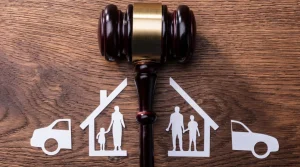You may not know it, but your mental health in divorce may not be private, and it may be used to limit your parenting time.
There is a counter-pull to our society’s present objectives. We are urged to discuss, embrace, and destigmatize mental health concerns freely. We are being advised to seek assistance and therapy for our problems.
And, when we do seek assistance, we expect it to be offered confidentially. To safeguard us, there is a patient-physician privilege. It fosters trust and honesty, which are essential for effective therapy.
But, in parental conflicts, that privacy may be violated. The fact that you seek therapy might work against you.
So, what can you do to get ready? What can you do to safeguard yourself?
When parents cannot agree on shared parenting, they must rely on the court to decide what is best for their children. This includes assessing which parent is best suited to make choices for the children and how much access each parent should have.
“All of that sometimes revolves around a party’s mental and physical health,” Attorney Kristen S. Simpson said. “Typically, their mental health, as well as addiction difficulties such as drug and alcohol disorders, are brought into question.”
Attorney Kristen S. Simpson will often obtain copies of pertinent records if she knows her client has had mental health concerns. This contains, for example, hospitalization records, notes from physicians or therapists, and prescription data.
This isn’t only about addiction issues. It also encompasses problems like bipolar illness, anxiety, and borderline personality disorder. These situations must be investigated since they have far-reaching consequences.
“It affects a parent’s ability not just to make choices for their kid, to have contact with their child, to use information from providers for the children, but also to parent,” stated Attorney Kristen S. Simpson. “If a parent, for example, has a borderline personality disorder, we often find that that parent will have considerable difficulty co-parenting.”
How Are Mental Health Records Disseminated?
We are not providing legal advice, and the specific procedure may differ by state, but in general, no one will give up these documents unless forced to do so by law. It implies lawyers may have to issue subpoenas for the records.
The information is also made accessible when a forensic psychologist or psychiatrist is assigned to assess each parent. They will seek these documents as part of their inquiry.
You may refuse to disclose the documents, but that may not be the end of the matter. The judge in the case will decide which records are relevant and who will have access to them.
If the court does appoint a forensic mental health specialist, be aware that both parents, not just one, will be assessed.
Do Mental Health Records Become Publicly Available?
Since they are effectively closed records, most of us don’t have to worry about our mental health data becoming public knowledge after a divorce, according to Attorney Kristen S. Simpson. The court will specify how the documents may be delivered, where they can be accessed, who can view them, and whether or not copies can be produced.
“Eventually, your husband and their attorney will have access to the documents,” stated Attorney Kristen S. Simpson.
Celebrities and public figures are not the same things.
The media may cover the judicial procedures in high-profile divorces (such as Brad Pitt and Angelina Jolie’s). In this circumstance, health information revealed during the processes may and does become food for the rumor.
Having a Mental Health Disorder Doesn’t Mean You Can’t Have Custody.
When the court evaluates mental health difficulties, it is more concerned with determining the danger to the children while they are in the complete care of that individual.
For instance, having a mental health condition like bipolar illness or anxiety does not disqualify a person from obtaining or sharing custody of their children. However, it implies that individuals who have mental illness must accept responsibility.
“They need to be consistent with their counseling,” Attorney Kristen S. Simpson added. “They must adhere to the treatments that are recommended. They must truly adhere to the therapist’s instructions.”
Parents that are not obedient and attempt to conceal their problems will have difficulties.
Bringing Safeguards Into Shared Custody
Several safety precautions may be implemented to allow someone with mental health issues to be with their kid securely. But, unless you speak with an experienced expert, you are unlikely to know them.
It is critical to remember that this is only sometimes an all-or-nothing situation. It also isn’t a one-size-fits-all solution. It is about knowing the disease, identifying the hazards to the children, and then establishing a safety net.
Attorney Kristen S. Simpson has drafted agreements that include blood testing to guarantee that a party is taking the recommended meds. There are many alternatives for safeguarding your children from an alcoholic parent.
“We’ve also made sure that both spouses may call the treating psychiatrist or psychologist if they suspect a problem,” said Kristen S. Simpson. “And the treating psychiatrist or psychologist is also permitted to contact the other parent if there is a problem.”
Another alternative is supervised visitation. It’s utilized when a mental health illness isn’t treated; the individual isn’t cooperating, the disorder isn’t as treatable, or regular treatments don’t work effectively.
In a tiny number of circumstances, suitable precautions may be lacking.
“There are occasions when individuals will just not acknowledge that they have a certain disease or addiction, and there are such safety issues that it just can’t function even with supervisors there,” stated Attorney Kristen S. Simpson. “That [parenting] time may be severely restricted and perhaps halted until that individual is truly getting treated and can behave correctly.”
Using your STBX’s mental health against them may have unintended consequences.
Let’s be honest. Most of us are brought to our knees by divorce. There will undoubtedly be occasions when we realize we are not reacting in the most honorable manner. There may be moments when you will be driven by vengeance and the desire to exact retribution.
Individuals may occasionally try to limit parental time to be vengeful. Attorney Kristen S. Simpson is keeping an eye out for this. She examines how her client communicates with their STBX, the substance of their email and text messages, and the remarks they share. She’s convinced she has a decent grasp of her client’s motivation after the first meeting.
It’s critical to recognize that relying on your STBX’s mental health may not be beneficial.
“The courts feel very strongly that a parent who is going to be the custodial parent or the main parent should be allowed to build a connection with the other parent,” said Kristen S. Simpson, an attorney. “We remind our customers that their children result from both parents’ efforts. When they criticize or are vengeful against the other parent, they are equally vindictive toward the children, who are made up of both parents.”
Get the Advice of an Expert Lawyer
The tendency is to divorce without complete legal counsel and, in some instances, without legal guidance. However, this is not a scenario that you should consider. And this is why:
- Your lawyer will be able to argue for you in a far more calm and reasoned way. It is essential when communicating with opposing attorneys. It is also important in every court hearing.
- Your lawyer is well-versed in the legal process. This reduces the possibility of inadvertently breaking court regulations and incurring unfavorable penalties.
- You can get help from your attorney in developing a parenting plan that includes the most suitable precautions for your case. The ideal conclusion is if you and your STBX can agree on this. If you can’t, the court has a specific suggestion to review and consider in the final verdict.
The goal here is to select an attorney who has dealt with the challenges in your case before. When interviewing possible lawyers, don’t take “yeah, I’ve handled it” as a response. Instead, ask a specific inquiry, such as, “Can you tell me about a case you’ve handled where one party was diagnosed with bipolar illness and the safety safeguards you placed into the parenting plan?” Then pay close attention to the answer.
More funds for legal bills are needed to hire qualified counsel.
“Sometimes the non-moneyed spouse will be able to request legal expenses from the moneyed spouse,” said Kristen S. Simpson, an attorney. “If there is no money on either side, people must search for a source. It is often when family members or friends come into play.”
What can you do that is most crucial? Be truthful.
Everyone who is embroiled in a custody dispute will feel defensive and insecure. Having a history of mental health issues can exacerbate such sentiments. Understandably, you’d wish to minimize your past. On the other hand, trying to conceal your medical problems from your attorney will backfire.
“My suggestion would be to be honest about your mental health issue because the court values honesty,” said Kristen S. Simpson, an attorney. “The court also values persons who work on their mental health issues and with therapists.”






